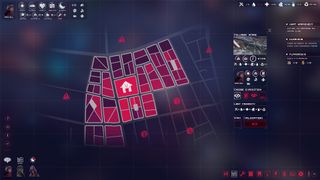Orphan Age is ‘The Sims meets Akira and Grave of the Fireflies’
Not sure this one will have a happy ending.

I was taken aback when co-developer Adrien Forestier gave me the headline description of Orphan Age, but to my surprise, as we worked through the game’s features, I came to see what he meant.
It opens with a couple of young survivors in a squalid empty building. You click on the kids and order them around individually, like Sims, but instead of picking the perfect sofa for your suburban living room, you raid piles of scrap for useful bits of cardboard and plastic. Slowly you craft a fire and build a place to sleep, and the children’s mood starts to tick up.
Your aim is to explore the wider city, bring more orphans back to your sanctuary, and then strike out to find you parents. Before all that you have to build yourself an orphan. The age you pick determines the points they can spend on their stats. If you pick the max age of 12 then they will be stronger and more resourceful than younger kids, but they also have a more complete understanding of the danger they are in, which can have a negative effect on their emotional wellbeing.

Your gang’s headspace matters. Every so often, in the face of a survival challenge like a leaking roof or a food crisis, your orphans will have a ‘Council’. That sounds like a meeting of robed cabalites, but actually it’s a little dialogue exchange the kids have around the fire. You have no direct say over these exchanges. Instead, the children respond to the mood and situation you’ve put them in and generate new courses of action, which serve as objectives when the council ends and you retake control.
I love the idea that you create an environment and a trajectory for your survivors, and then let the game take over to see how that plays out. It’s too early to tell how complex this system really is. In the example I saw near the start of the game my strong, tool-savvy orphan decided that the best way to escape the derelict house would be to craft a crowbar and crank open stuck doors, which was an outcome purely derived from the stats I’d chosen for him. Hopefully these events have more to them when you’ve recruited a few extra survivors.
For now, in pre-Early Access state, the moment-to-moment looting and crafting is slow, and the dark atmosphere suffered against the ruckus of the Gamescom show floor. In the dark streets beyond my orphans’ sanctuary, I could see neon shopfronts, which is where the Blade Runner and Akita influences kick in. With music, and away from conference lights, the game’s tone might support the laborious gathering.

I wonder how threats will escalate between crises. The children have been orphaned by a mysterious ‘cyberpunk apocalypse,’ and the devs implied that adult aggressors could pose a threat, though they are taking pains not to show any violence towards the orphans. The kids might scrabble to a hiding place and become anxious, but you won’t see them directly harmed. It’s grim, but not Oliver Twist levels of grim.
The biggest gaming news, reviews and hardware deals
Keep up to date with the most important stories and the best deals, as picked by the PC Gamer team.
Orphan Age has an intriguing premise and some neat ideas, but it’s in a very early stage at the moment. The Early Access launch is coming later this year, and the two-strong dev team want the first portion to be well-polished before they expand the game to its full state. Keep an eye on the Steam page in the meantime, where you can check out a demo and sign up for closed alpha access.
Part of the UK team, Tom was with PC Gamer at the very beginning of the website's launch—first as a news writer, and then as online editor until his departure in 2020. His specialties are strategy games, action RPGs, hack ‘n slash games, digital card games… basically anything that he can fit on a hard drive. His final boss form is Deckard Cain.
Most Popular


